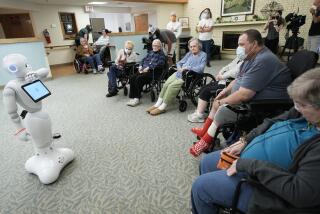She Knows the Life of a Caregiver
- Share via
The job entails endless hours, no pay and a varied workload--everything from cutting up food to securing a wheelchair, emptying a bedpan and dressing grown-ups.
Family caregivers--13 million strong, by some estimates--have no formal training to help their elderly, physically or mentally ill family members get through the day, and in the process often drive themselves to the brink of exhaustion.
But there is hope: former First Lady Rosalynn Carter, who has made care-giving her mission. Before Carter flew here last weekend to deliver a keynote address at a caregivers’ symposium at the City of Hope National Medical Center and Beckman Research Institute in Duarte, she talked by phone about her favorite population.
“It’s a real difficult situation,” says Carter, now 69. “Businesses and corporations are beginning to realize that it is. They are beginning to do flex hours or time sharing for employees, even counseling sessions.”
She compares the challenge facing family caregivers today to that facing workplace-bound women in search of quality child care decades ago.
In a study begun in 1990 at the Rosalynn Carter Institute for Human Development at Georgia Southwestern State University, researchers found that 88% of family caregivers said the job was rewarding but that 21% also said it was a burden. Most family caregivers are women, many the oldest daughter.
The profile hits home for Carter.
“My mother is 90,” she says. “I am the oldest, the daughter, and she still wants me home all the time.”
The guilt Carter used to feel over that impossibility is shared, she has discovered, with many caregivers, who also feel lonely and frustrated. One woman caring for her ill father fantasized about running away--and one day checked into a hotel. Within hours she was so overcome by guilt that she returned, and found her father where she’d left him.
“These things make an impression on you when you are there and see the people and the circumstances,” Carter says in her soft drawl.
In her own childhood, Carter’s father and grandfather were cared for by her mother.
These days, “there are . . . more people to call,” Carter says. In her book “Helping Yourself Help Others”--written with Susan K. Golant and reissued in January (Random House)--there are 30 pages of resources for caregivers.
At a recent caregivers meeting, Carter says participants shared burnout-prevention tips.
“Go out in the car and blow the horn.” “Beat on the bed with a tennis racquet.”
Adds Carter: “Take a little time for yourself. Appreciate your own efforts.”


